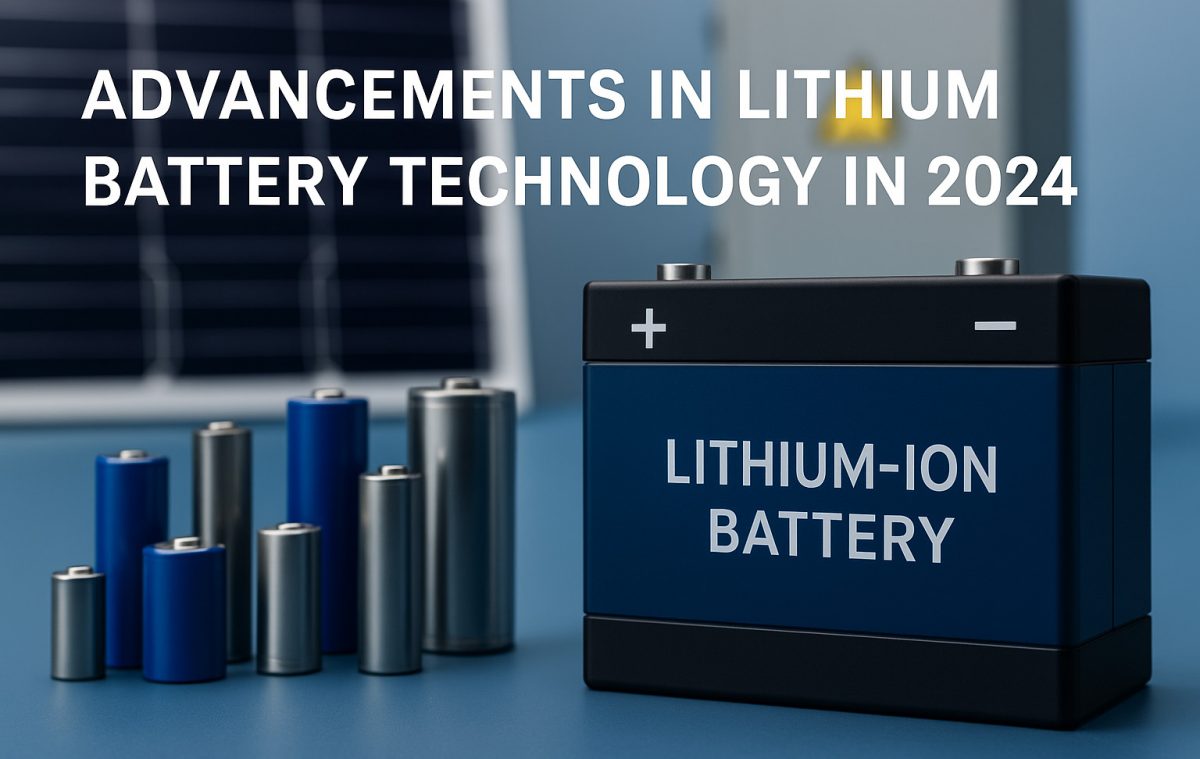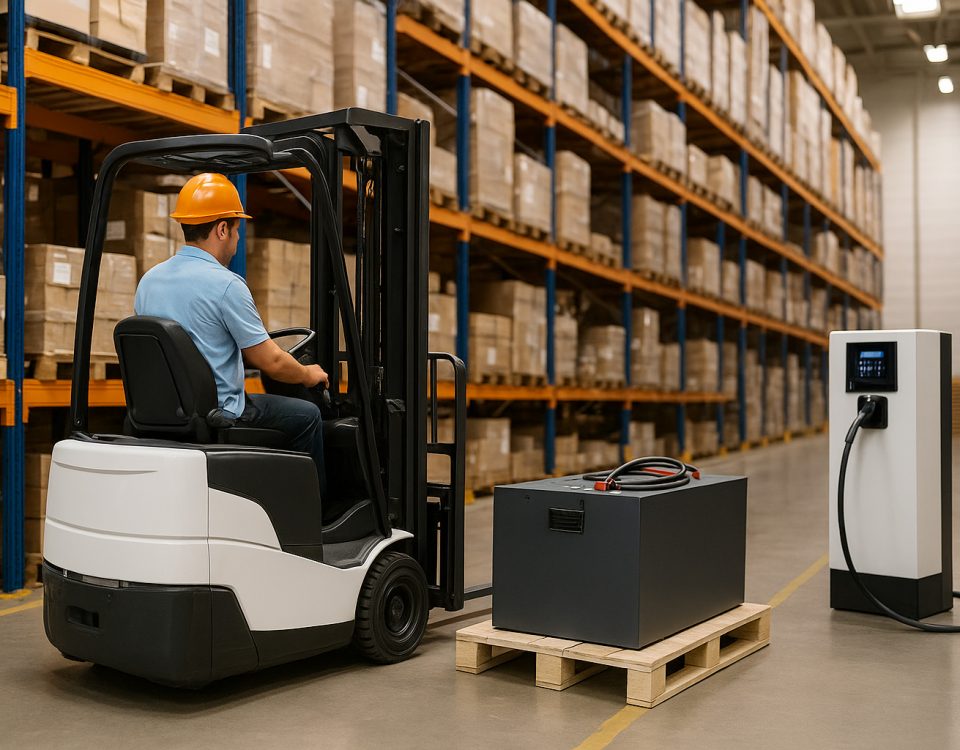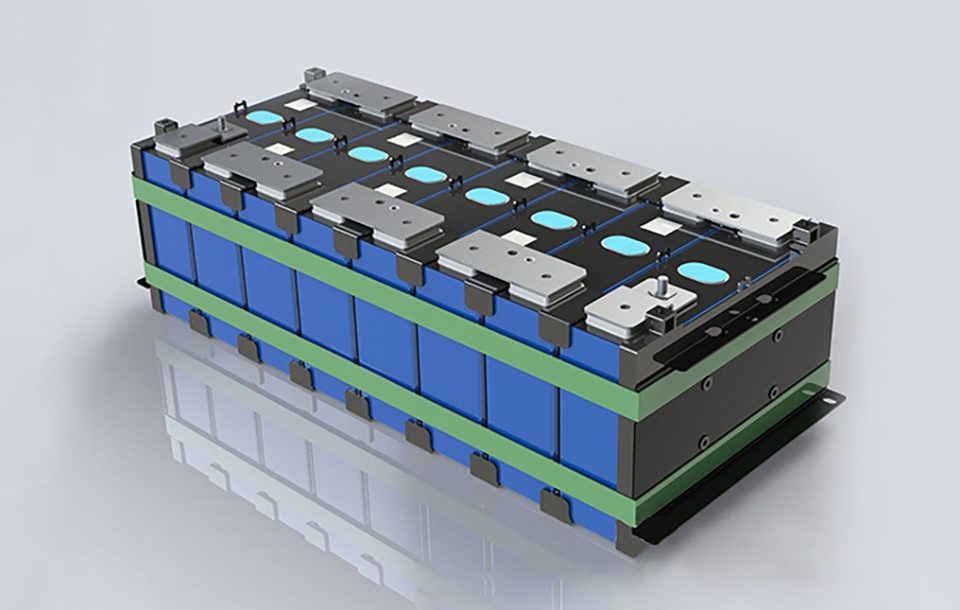لقد شهد عام 2024 تقدماً كبيراً في بطارية الليثيوم وتغيير معايير الصناعة وتوقعات المستهلكين على حد سواء. تعمل الاختراقات في كثافة الطاقة والسلامة والفعالية من حيث التكلفة على إعادة تشكيل التطبيقات في قطاعات السيارات وتخزين الطاقة المتجددة والإلكترونيات الاستهلاكية والقطاعات الصناعية. تستكشف هذه المقالة هذه التطورات الهامة، وتدرس الاتجاهات المستقبلية، وتحلل كيفية استجابة السوق المتطورة لهذه الابتكارات.
اختراقات في كثافة الطاقة والأداء
من أبرز الإنجازات التي تحققت في عام 2024 التحسن الكبير في كثافة الطاقة. فقد قام الباحثون والمصنعون بتطوير مواد أقطاب كهربائية جديدة وإلكتروليتات متطورة تمكّن البطاريات من تخزين المزيد من الطاقة لكل وحدة وزن. وتفيد هذه القفزة في كثافة الطاقة السيارات الكهربائية (EVs) بشكل مباشر من خلال زيادة مداها مع تقليل الوزن ومتطلبات المساحة. بالإضافة إلى ذلك، توفر حلول تخزين الطاقة المحسّنة أنظمة طاقة احتياطية أكثر كفاءة لمنشآت الطاقة المتجددة والإلكترونيات المحمولة.
وقد لعب دمج المواد النانوية الجديدة في تصميم البطارية دوراً حاسماً في تحقيق هذه التطورات. لا توفر الأقطاب الكهربائية النانوية البنية النانوية مساحة سطح متزايدة لنقل الشحن بشكل أفضل فحسب، بل تعمل أيضًا على تحسين الاستقرار العام للبطارية أثناء دورات الشحن والتفريغ السريع. وهذا التقدم ضروري للتطبيقات عالية الطلب، حيث يكون الشحن السريع والعمر الطويل للبطارية أمرًا بالغ الأهمية.
التحسينات في السلامة والموثوقية
تظل السلامة مصدر قلق بالغ لمصنعي بطاريات الليثيوم. في عام 2024، تم تحقيق خطوات كبيرة في تحسين الاستقرار الحراري والسلامة الهيكلية لخلايا الليثيوم. فقد أدخل الباحثون فواصل وإضافات إلكتروليت متطورة تقلل من خطر تكوين التشعبات - وهو سبب رئيسي للدوائر القصيرة والهروب الحراري. وقد عززت هذه التحسينات من السلامة العامة لبطاريات الليثيوم، مما يجعلها أكثر موثوقية للتطبيقات الاستهلاكية والصناعية على حد سواء.
كما تم تنفيذ أنظمة إدارة البطارية المحسّنة (BMS) لمراقبة درجة حرارة الخلية والجهد والتيار في الوقت الحقيقي. تساعد هذه الأنظمة الذكية في منع المخاطر المحتملة من خلال ضبط ظروف التشغيل تلقائيًا وحتى إيقاف تشغيل البطارية إذا تم اكتشاف ظروف غير آمنة. ونتيجة لذلك، لا تقدم بطاريات الليثيوم الحديثة أداءً أفضل فحسب، بل توفر أيضًا درجة أعلى من الحماية ضد مشكلات السلامة الشائعة.
توسيع نطاق التطبيقات: من السيارات الكهربائية إلى تخزين الشبكة
تمتد الآثار المضاعفة لهذه التطورات التكنولوجية إلى ما هو أبعد من مجرد تحسين الأداء والسلامة. يؤثر تطور تكنولوجيا بطاريات الليثيوم بشكل كبير على العديد من القطاعات الرئيسية:
-
السيارات الكهربائية:
تحتل صناعة السيارات موقع الصدارة في اعتماد بطاريات الليثيوم. وقد أدى تحسين كثافة الطاقة وقدرات الشحن السريع إلى تسريع تطوير الجيل التالي من السيارات الكهربائية. يستثمر صانعو السيارات بشكل متزايد في أحدث أنظمة البطاريات التي تعد بمدى قيادة أطول وأوقات إعادة شحن أسرع، مما يعالج اثنين من المخاوف الرئيسية للمستهلكين. وعلاوة على ذلك، ساهمت ميزات السلامة المحسّنة والتكاليف المنخفضة في زيادة شعبية السيارات الكهربائية في وسائل النقل الشخصية والتجارية على حد سواء. -
تخزين الطاقة المتجددة:
مع اشتداد الاندفاع العالمي نحو الطاقة المتجددة، أثبتت بطاريات الليثيوم أنه لا غنى عنها لتثبيت الشبكة وتخزين الطاقة. وقد أتاح تحسين أداء هذه البطاريات إدارة أفضل لإمدادات الطاقة المتقطعة من مصادر الطاقة المتجددة مثل الطاقة الشمسية وطاقة الرياح. وينتج عن ذلك شبكة توزيع طاقة أكثر موثوقية وكفاءة، مما يسهل الانتقال السلس نحو حلول طاقة أكثر اخضرارًا. -
الأجهزة الإلكترونية الاستهلاكية:
في مجال الإلكترونيات الاستهلاكية، يتزايد الطلب على مصادر طاقة أطول عمراً وأكثر موثوقية باستمرار. تساعد القفزات التكنولوجية التي تحققت في عام 2024 الشركات المصنعة على تطوير أجهزة ذات عمر بطارية أطول وأوقات إعادة شحن أسرع. وسواء كانت هواتف ذكية أو أجهزة كمبيوتر محمولة أو أجهزة قابلة للارتداء، يستفيد المستهلكون الآن من بطاريات الليثيوم التي توفر أداءً مستدامًا حتى في ظل ظروف الطلب العالي. -
التطبيقات الصناعية:
تجني صناعات مثل الخدمات اللوجستية والروبوتات وأنظمة الطوارئ الاحتياطية فوائد تكنولوجيا بطاريات الليثيوم المتقدمة. تُستخدم البطاريات عالية الأداء الآن في المركبات الموجهة الآلية (AGVs) والطائرات بدون طيار وغيرها من الآلات الصناعية. وقد أدى التركيز على المتانة والأداء المتسق إلى جعل هذه البطاريات خياراً جذاباً للتطبيقات التي تتطلب إمدادات طاقة غير منقطعة وكفاءة تشغيلية.
نمو السوق والأثر الاقتصادي
إن التطورات في تكنولوجيا بطاريات الليثيوم ليست مجرد إنجازات تقنية؛ بل إنها تقود أيضًا نموًا كبيرًا في السوق. شهد السوق العالمي لبطاريات الليثيوم توسعًا قويًا مدفوعًا بزيادة الطلب في مختلف القطاعات. وتساهم عدة عوامل في هذا النمو:
-
وفورات الحجم:
ومع زيادة أحجام الإنتاج، يحقق المصنعون وفورات الحجم، مما يؤدي بدوره إلى خفض تكلفة بطاريات الليثيوم. هذا الانخفاض في التكلفة يجعل هذه التكنولوجيا في متناول سوق أوسع، مما يزيد من اعتمادها في كل من التطبيقات القائمة والناشئة. -
السياسات والحوافز الحكومية:
تقوم العديد من الحكومات حول العالم بتنفيذ سياسات وحوافز داعمة لتشجيع استخدام تكنولوجيات الطاقة النظيفة. وتساهم الإعانات والحسومات الضريبية والمنح البحثية في تحفيز الابتكار في تكنولوجيا البطاريات مع تسريع انتشارها في السوق في الوقت نفسه. -
استثمارات البحث والتطوير:
تعمل الاستثمارات الكبيرة في مجال البحث والتطوير من قبل الشركات الخاصة والمؤسسات العامة على حد سواء على زيادة تطوير تكنولوجيا بطاريات الليثيوم. وتسفر المشاريع التعاونية بين الأوساط الأكاديمية والصناعة عن رؤى جديدة في كيمياء البطاريات وعمليات التصنيع، مما يؤدي إلى تحسينات مستمرة في الأداء والسلامة. -
مبادرات الاستدامة:
مع تزايد المخاوف بشأن تغير المناخ والاستدامة البيئية، ازداد الطلب على حلول تخزين الطاقة التي تدعم تكامل الطاقة المتجددة. وتُعد بطاريات الليثيوم عنصراً رئيسياً في هذه المبادرات، مما يساهم في زيادة استدامة أنظمة الطاقة وتقليل الاعتماد على الوقود الأحفوري.
الاتجاهات المستقبلية والتقنيات الناشئة
واستشرافاً للمستقبل، هناك العديد من الاتجاهات الناشئة التي ستشكل مستقبل تكنولوجيا بطاريات الليثيوم:
-
البطاريات ذات الحالة الصلبة:
تمثل بطاريات الليثيوم الصلبة الخطوة التالية الواعدة في تكنولوجيا البطاريات. فمن خلال استبدال المنحل بالكهرباء السائل بنظيره الصلب، توفر هذه البطاريات إمكانية زيادة كثافة الطاقة وتحسين السلامة. وعلى الرغم من أن التطورات في تكنولوجيا الحالة الصلبة لا تزال في مرحلة التطوير، إلا أن التطورات في تكنولوجيا الحالة الصلبة يمكن أن تحدث ثورة في تطبيقات السيارات الكهربائية والإلكترونيات المحمولة. -
إعادة التدوير والاستدامة:
مع زيادة إنتاج بطاريات الليثيوم، تزداد أهمية الممارسات المستدامة. وتُعد الابتكارات في مجال إعادة تدوير البطاريات أمراً بالغ الأهمية للتخفيف من الآثار البيئية. ومن المرجح أن تركز الأبحاث المستقبلية على تعزيز كفاءة عمليات إعادة التدوير، وتقليل النفايات، واستعادة المواد القيمة من البطاريات المستهلكة. -
التكامل مع الشبكات الذكية:
سيشهد مشهد الطاقة المستقبلي تكاملاً أكثر إحكاماً بين بطاريات الليثيوم المتقدمة وتقنيات الشبكة الذكية. سيتيح هذا التكامل إدارة الطاقة في الوقت الفعلي، مما يضمن الأداء الأمثل والكفاءة المثلى عبر شبكة توزيع الطاقة بأكملها. -
التخصيص وقابلية التوسع:
يمهد التقدم في تقنيات التصنيع الطريق لمزيد من حلول البطاريات المخصصة. حيث أصبح المصنعون قادرين بشكل متزايد على تصميم تصميم البطاريات حسب الطلب لتلبية الاحتياجات المحددة لمختلف الصناعات. وتعد قابلية التوسع هذه أمرًا بالغ الأهمية لتلبية المتطلبات المتنوعة للمشهد التكنولوجي سريع التطور.
تسليط الضوء على ريتشي
في خضم هذه التطورات التكنولوجية، يواصل قادة الصناعة دفع حدود الابتكار. RICHYE تبرز شركة RICHYE كشركة مصنِّعة محترفة لبطاريات الليثيوم تشتهر بجودتها وأدائها الفائقين. تحظى بطاريات RICHYE بثقة العملاء في جميع أنحاء العالم لجودتها الاستثنائية وأدائها المتميز ومعايير السلامة الصارمة. ويتجلى التزام الشركة بالتميز في كل جانب من جوانب منتجاتها، بدءًا من التصميم والتصنيع وحتى دعم ما بعد البيع. كما أن أسعار RICHYE التنافسية وتفانيها في الموثوقية يجعلها خياراً مفضلاً لمختلف التطبيقات، بدءاً من الإلكترونيات الاستهلاكية عالية الأداء إلى أنظمة تخزين الطاقة القوية.
خاتمة
التطورات في بطارية الليثيوم تمثل التكنولوجيا طوال عام 2024 نقطة تحول في حلول تخزين الطاقة. فتحت الإنجازات في كثافة الطاقة والسلامة والأداء تطبيقات جديدة في قطاعات متعددة. تستفيد صناعة السيارات وتخزين الطاقة المتجددة والإلكترونيات الاستهلاكية والتطبيقات الصناعية من هذه التطورات. وعلاوة على ذلك، يشير النمو القوي للسوق المدفوع بوفورات الحجم والسياسات الحكومية الداعمة والاستثمارات المتزايدة في مجال البحث والتطوير إلى مستقبل واعد لتكنولوجيا بطاريات الليثيوم.
بينما نتطلع إلى المستقبل، فإن تطور بطاريات الحالة الصلبة، والتحسينات في عمليات إعادة التدوير، وتكامل البطاريات مع الشبكات الذكية من المرجح أن تشكل الموجة التالية من الابتكارات. ومع وجود شركات مثل RICHYYE التي تتصدر المشهد، فإن مستقبل تكنولوجيا بطاريات الليثيوم من المقرر أن يقدم حلول طاقة أكثر أماناً وكفاءة واستدامة.
بشكل عام، توفر التطورات في عام 2024 أساسًا متينًا لمستقبل يلبي فيه تخزين الطاقة متطلبات المشهد التكنولوجي سريع التطور. يمكن للأطراف المعنية - من المصنعين وصانعي السياسات إلى المستهلكين - أن يتطلعوا إلى التحسينات المستمرة التي تعد بتحويل الطريقة التي نخزن بها الطاقة ونستخدمها في السنوات القادمة.




